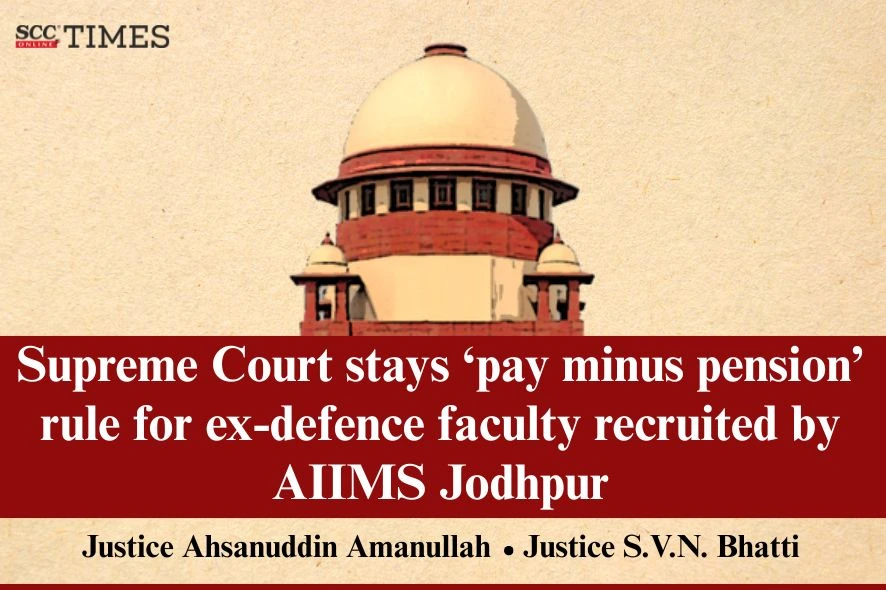Supreme Court: In a Special Leave Petition filed by retired defence officers who had been appointed to faculty posts at AIIMS Jodhpur through open advertisement and direct recruitment, the petitioners challenged a judgment passed by the Rajasthan High Court. The High Court had held that, although the petitioners were appointed through direct recruitment, they would be governed by Regulation 33 of the AIIMS Regulations, 1999. While the High Court restrained retrospective salary deductions, it allowed the prospective application of the “Pay minus Pension” formula from the date of its judgment, i.e., 15-05-2025. In response, a Division Bench of Ahsanuddin Amanullah and S.V.N. Bhatti, JJ. issued notice and granted interim relief to the recruited faculty members, staying the implementation of the “Pay minus Pension” rule pending further consideration.
Background
All four petitioners were distinguished medical professionals who had previously served in the Indian Armed Forces and took premature retirement to join AIIMS Jodhpur against advertised faculty posts. Their appointments were made through a direct recruitment process pursuant to public advertisements issued between 2015 and 2020. Each petitioner was selected on merit, issued appointment letters, and confirmed in service upon successful completion of their probation periods. The petitioners submitted that neither the advertisements nor the appointment letters contained any clause indicating the applicability of the “Pay minus Pension” rule.
From the time of their appointments until late 2023, the petitioners had been drawing full salaries in accordance with the terms of their appointments. However, in November 2023, the Ministry of Health and Family Welfare (MoHFW) issued internal communications and office memoranda directing AIIMS institutions to apply the “Pay minus Pension” formula to all retired government servants, citing the Central Civil Services (Fixation of Pay of Re-employed Pensioners) Orders, 1986. In compliance with this directive, AIIMS Jodhpur issued an internal circular dated 24-11-2023, instructing affected employees to disclose their pension details, thereby initiating the process for retrospective salary recovery.
Aggrieved by the Ministry’s directive, the petitioners approached the Central Administrative Tribunal (CAT), Jodhpur. The Tribunal held that although the petitioners were to be treated as “re-employed persons” under Regulation 33 of the AIIMS Regulations, 1999, the retrospective recovery of salary already drawn was impermissible. It further ruled that the “Pay minus Pension” formula could not be applied to appointments made through direct recruitment.
Challenging the Tribunal’s reasoning, both parties filed writ petitions before the Rajasthan High Court. The petitioners contested their classification as re-employed persons, while the respondents (AIIMS) sought full implementation of the deduction rule. In its common judgment dated 15-05-2025, the High Court affirmed the Tribunal’s finding that the petitioners were re-employed pensioners and permitted prospective application of the “Pay minus Pension” rule from the date of judgment. However, it barred any retrospective recovery of salaries already paid.
The petitioners raised substantial legal and constitutional grounds, contending inter alia:
- That their appointments were made pursuant to open advertisements and a merit-based direct recruitment process, and not through re-employment, deputation, or contractual engagement, each of which constitutes a distinct mode of service governed by separate legal frameworks.
- That Regulation 33 of the AIIMS Regulations, 1999, which pertains exclusively to re-employed pensioners, was inapplicable to individuals appointed through direct recruitment on regular terms and conditions.
- Neither the recruitment advertisements nor the appointment letters issued to the petitioners contained any clause invoking the “Pay minus Pension” rule, and therefore, the post-appointment imposition of such a condition would be legally untenable.
-
That the unilateral alteration of salary terms after confirmation in service, and without prior disclosure at the time of recruitment, violated the petitioners’ rights to legitimate expectation, principles of natural justice, and contractual certainty.
Court’s Order:
The Court, after hearing the matter, issued notice in all four connected Special Leave Petitions and granted interim relief to the petitioners. It directed that the petitioners be paid the salary they were receiving prior to the impugned judgment.
This interim order effectively stayed the implementation of the “Pay minus Pension” rule, thereby maintaining the petitioners’ pre-existing salary structure until further orders.
[Dr. Arjun Singh Sandhu v. All India Institute of Medical Science, 2025 SCC OnLine SC 1468, decided on 14-07-2025]
Advocates who appeared in this case:
For Petitioners: Mr. Rana Mukherjee, Sr. Adv., Mr. Gagan Gupta, Sr. Adv., Mr. Abhinay, AOR, Mr. Pooran Chand Roy, Adv., Ms. Deeksha Prakash, Adv.,Ms. Kirti Vyas, Adv., Mr. Samarth Mohanty, Adv.



